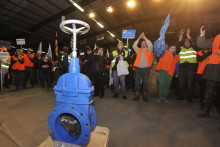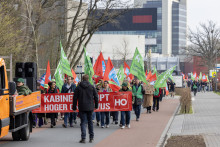The public protests in the north-eastern part of the province of Groningen were a hot Dutch news item last month. No wonder perhaps: after years of lucrative gas extraction in that region, rebelling locals now threaten to end the extraction. One reason is that the winning of gas is increasingly leading to earthquakes that damage their houses.
But anger is also fuelled by the poor local economy. Unemployment-stricken north-east Groningen is officially the poorest region of the Netherlands, and many young people leave in search of better economic horizons elsewhere.
Distribution of state money
The Groningers have counterparts in many parts of the world. Former UT student of Public Administration Ank Bijleveld, who today serves as Commissioner to the King for Overijssel, explains that when it comes to the distribution of state funds for, for example, infrastructure or technological innovation, peripheral areas often receive disproportionally little. Based in the capital or nearby, and often coming from these regions as well, national policy-makers tend to focus on projects in their vicinity, leading to a positive local bias when it comes to the distribution of (state) money.
Read the full story about borderlands in UT Nieuws Magazine tomorrow.







